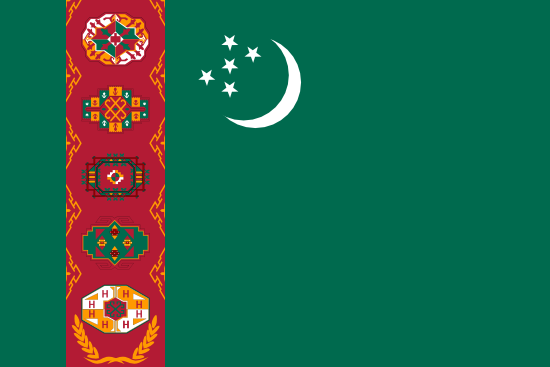
Health Insurance in Turkmenistan, Asia
Information expatriation
Capital City: Ashgabat
Total area: 488,100 km2
Population: 4,965,000
Money: Currency Converter
Time Zone: List of time Zones by Country
Calling Code: +993 XXX
Practical Information:
Health Product: Travel Insurance and Health insurance
Health Insurance information and Sanitary Risk: World Health Map
BLOG: Expat Health insurance Information
Here is a brief description of the healthcare system in the country:
· Turkmenistan has a universal healthcare system that is funded and managed by the government. It aims to provide free medical care to all citizens.
· Care is delivered through public clinics, hospitals and healthcare facilities located across the country in both urban and rural areas.
· Primary care is the first point of contact and is available through neighborhood polyclinics and rural medical stations.
· Larger district and regional hospitals offer more specialized services like surgery, maternal care, diagnostics etc.
· Healthcare resources and quality can vary depending on location, with more availability in cities versus remote areas.
· Preventative and public health programs focus on diseases like tuberculosis, malaria and immunization coverage.
· Staffing and infrastructure face persistent challenges due to the aging Soviet-era system and remote terrain.
· Private medical practice is legally permitted but remains limited due to reliance on public funding.
· Health outcomes have improved over time but infectious diseases and non-communicable conditions remain issues.
· Ongoing reforms aim to decentralize, develop e-health systems, increase healthcare spending and modernize facilities nationwide.
Here are some key health considerations for expatriates living in the country:
· Purchase international medical evacuation insurance. Public system quality/coverage varies significantly depending on location.
· Ensure vaccinations are up to date, especially hepatitis A/B, typhoid, tetanus, polio and measles boosters as outbreaks occasionally occur.
· Mosquito-borne diseases like malaria exist in some rural areas - use nets, repellent, and long sleeves at dusk when outdoors.
· Only drink bottled/purified water and be cautious with raw produce given potential for parasites.
· Air pollution in major cities can impact those with respiratory issues - consider masks.
· Facilities outside urban centers have limited resources - prepare to travel for serious care needs.
· Bring extra supplies of any prescription medications plus copies of valid prescriptions.
· Driving safety risks include poor infrastructure and non-enforcement of laws. Drive defensively at all times.
· Remote locations have delayed emergency response - ensure precautions and don't overextend yourself physically.
· Register with international medical groups upon arrival and get referrals for care as needed.
· Stress of adaptation/isolation can impact health - maintain connections and self-care routines.
